北京理工大学05年博士生入学英语考试翻译试题
Part Ⅲ. Translation (30 points)
A. Translate the following two short paragraphs into Chinese. (10 points)
1.
We do not make mistakes on the basis of race or color. We do not make them because we are male or female, young or old. We do not make mistakes of choice or judgment because we want to make mistakes. We make them because we are human. Mistakes, bad judgments, the stupid things we do are all a part of being human. We cannot hide from who we are. We should not hide from what we do. When we acknowledge our mistakes or errors and face up to our human shortcomings, no one can use them against us.
2.
We are first and foremost responsible to and for ourselves. We can help other people. We can assist other people. What we cannot do is make what we do for others or what others do for us more important than what we do for ourselves. When we find something or someone creating in our lives something we do not want, we must muster the courage and strength to tell them to stop it. When we do, we preserve our sense of self.
B. Translate the following two paragraphs into English. (20 points)
来源:www.exam
几年前我认识一个非常聪明但任性的中国青年,他急切地想去美国读大学,但又没有被他申请的长春藤联合会名牌大学录取。所幸的是,一所在美国人,特别是受过高等教育的美国人当中享有盛誉的规模较小的文科大学向它提供了奖学金,但这所大学在中国几乎不为人知。凡是听我说起他的情况的美国人都觉得他真该高兴,然而,这位年轻人却被焦虑所困扰。这所大学的名次在他所咨询的排行榜上并不靠前,他的同学们也全然不知这所学校,因此同学们的祝贺也就不那么热烈了。难道这一“成功”真是个失败?他是不是该留在北京上那所已录取他了的尖子大学?或者是他到了美国就转学到一所他认为原本应接收他的名牌大学去?当启程的时间到来时,他是那么拿不定主意,乃至向朋友们表示遗憾。
这是个名次是那么有害的例子。要想知道什么意味着最好的大学显然是不可能的,因为每个人的标准都与别人不同;即使他们都同意某一个特定标准,他们对一个学校的估价也往往反映出信息的不完整和个人的不同看法等问题。我也许特别关注图书馆的质量,你可能强调计算机的使用方便程度,另一个人可能觉得图书馆与计算机都不如师生的交往重要,这又该如何确定呢?











